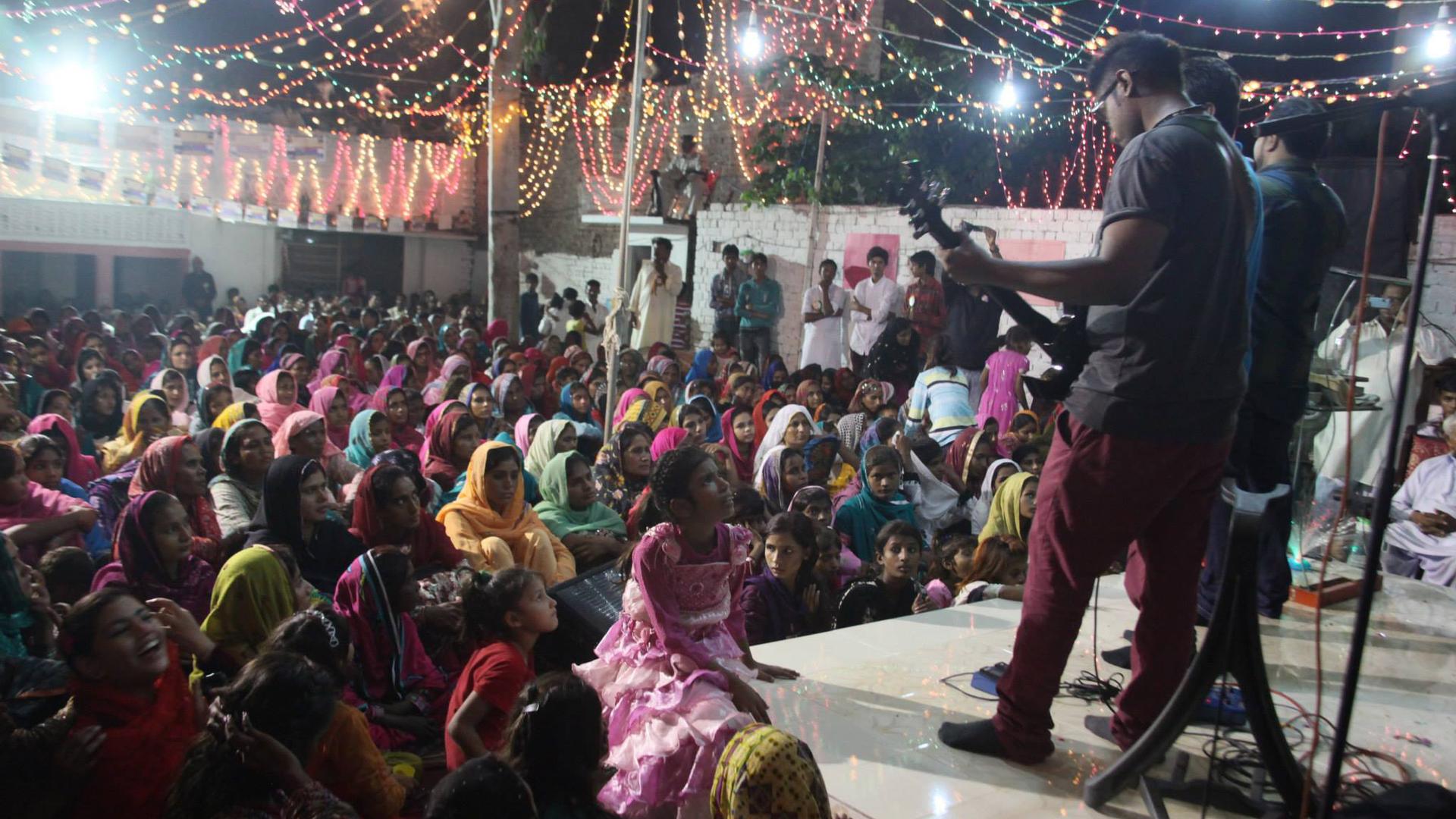Hallelujah? Christian rock is gaining popularity in Pakistan — under the radar
Hallelujah performs at an annual prayer event in Kasur, Pakistan.
Christians have been using music in Pakistan since the first missionaries accompanied European colonizers to the region in the 18th century.
Reverend Imam Deen Shahbaz was a convert to Christianity and a pastor appointed by the United Presbyterian Church of North America. In the 1880s he started translating the psalms in to Punjabi and composed a melody for each one based on the local musical traditions of the region. This native form of scripture was an instant success in the Christian community, and those melodies continue to be a staple in Punjabi churches across Pakistan and India today.
It wasn't long before Christians who sang in church crossed into Pakistan's mainstream music scene. Some of the most prominent playback singers during the heyday of Pakistan's commercial film industry were Christians, including S.B. John, Saleem Raza and A. Nayyar.
In Pakistan's biggest city, Karachi, the Christian community has traditionally been dominated by Catholics of Goan ancestry — descended from the former Portuguese colony in India. As early as the 1940s, jazz and rock cover bands made up of young Goan musicians were playing in Karachi's nightclubs. Many of them would gain a cult following in the city, with names like The Panthers, The In Crowd and The Talisman.
Today, there are even a handful of Pakistani bands that play something similar to Christian rock, the spiritual music genre that has become a major industry in the west. One such band is a six-man team based in the city of Lahore called Hallelujah. By day, they work as professional music producers and sound engineers for other musicians, TV commercials and movie soundtracks. But in their free time they get together to play rock and pop music inspired by their religion.
The music video of one of their recent songs, “Rab Janay,” or “God Knows,” starts with a number of verses from the Bible. Then a distorted guitar riff and electronic drum beats kick in and we see the band members performing inside an empty church with their electric guitars and amplifiers. The lyrics for this song are in Punjabi, and the refrain is “God knows the state of your hearts.”
They distribute their music over the Internet, and regularly get invited to play at worship services in church. They sing about common Christian themes related to Jesus and spirituality, in a mix of Punjabi, Urdu and some English. One of their songs, “Rahber,” or “Guide,” is notable because it managed to get air time on one of Pakistan small, mainstream music TV channels this year.
The band members say they are musically influenced by both Pakistani rock, folk and gospel traditions, as well as by contemporary western Christian music. Guitarist Waqar Gill names acts Chris Tomlin and Hillsong as musical role models.
“This is a genre of music that we like because we are guitar musicians. We like rock, we like headbanging,” Gill says.
Traditionally, church music in Pakistan was based on either local folk music or Western-style choirs. But Hallelujah's band members say they want Pakistani gospel music to be more relevant to today's youth.
“We think that the youth should do the Christian music,” says Hallelujah's composer and keyboard player Anthony Soshil. “So that is why we bring guitars, keyboards, pads, new beats into the gospel music so that the youth of Christian people can sing the Christian songs.”
Soshil explains that Christians in Pakistan often have a headstart over many of their compatriots when it comes to learning music.
“When a child goes to church at the age of 3 or 4, he listens to Christian hymns there. He sees the choir, the musicians playing over there. He gets a spark that 'what is this man?' There is something new, and in the church," Soshil says. "So, first thing in the mind he thinks is that it can not be wrong because it's in church.”
Hallelujah's aim isn't to win over converts, but to use their music to help unite the diaparate Christian community in Pakistan.
“The message [we] want to send is that we are together in one area for a reason and the only reason we are connected is to show the people and the world a unity," says Gill. “There are so many churches and denominations in Pakistan. We don't want to present ourselves as Catholics or Protestants or Pentecostals. We want to show that we are just Christians.”
It isn't easy being a Christian in Pakistan. They have increasingly been the target of violence from Muslim extremists in recent years. In 2011, a Christian government minister was assassinated by a gunman. In March, mobs attacked a Christian neighborhood in Lahore, setting fire to more than 150 homes. And in September, a church in the northern city of Peshawar was attacked by suicide bombers, killing some 80 worshipers.
This is in addition to everyday discrimination in society and by the state.
“So many times at the airport when I go abroad or anywhere, the immigration guys look at me like this and say 'Oh you're an Anthony'. Like that, you know. It's not acceptable for everyone,” Soshil says.
However, the band members say they have always received support from other Muslim musicians that they work with every day.
Hallelujah and other Christian rockers aren't widely known outside of the Christian community so, at least for now, they don't perceive themselves to be under the threat of violence because of their music.
And because the Christian community is so small, its unlikely they'll ever be a major act in Pakistan. But, the band members say, their music was never about getting mainstream popularity.
We want to hear your feedback so we can keep improving our website, theworld.org. Please fill out this quick survey and let us know your thoughts (your answers will be anonymous). Thanks for your time!
